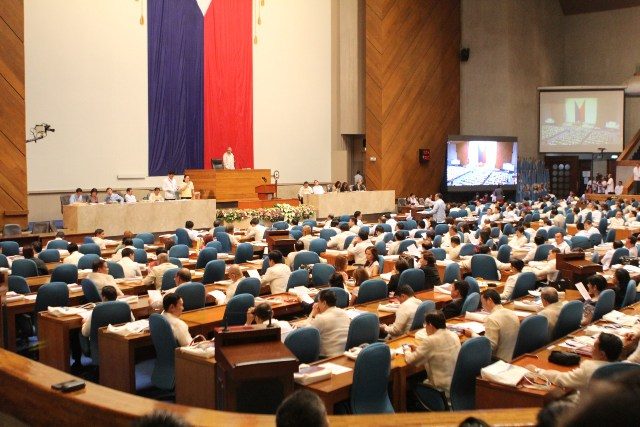MANILA, Philippines – The House of Representatives has approved on second reading a bill seeking to strengthen the security of tenure of workers in the private sector, but militant lawmakers from the Makabayan bloc described it as a “deceitful and bogus security of tenure” measure.
House Bill No. 6908 seeks to address the practice of labor-only contracting and “endo” (end of contract) by amending Presidential Decree No. 442 or the Labor Code of the Philippines.
While the bill prohibits “labor-only contracting,” it permits “legitimate job contracting.”
It said that there is labor-only contracting “where the person supplying workers to an employer does not have substantial capital or investment in the form of tools, equipment, machineries, work premises, among others or has no control over the workers’ methods and means of accomplishing their work, or the workers recruited and placed by such persons are performing activities which are directly related to the principal business of such employer.”
A new provision was proposed to be included in the Labor Code, which will require all job contractors to obtain a license from the Department of Labor through its regional offices.
The bill refers to job contractor as “a sole proprietorship, corporation, partnership, association, cooperative or any other organization that performs a specific work, job or service for a principal employer.” The principal employer refers to the person or entity, including the government, that contracts out a specific work, job or service.
To be issued a license, the job contractor must be an independent business, separate and distinct from the principal employer; must have a paid-up capital or capitalization of at least P5 million; must have an undertaking of financial capacity and compliance with all labor law and regulations; among others.
The Department of Labor and Employment may impose a fine of P30,000 for a person or entity operating as job contractor without a license. A job contractor without a license and who also commits acts qualified as labor-only contracting will be fined P30,000 assessed per employee engaged under labor-only contracting arrangement, but not to exceed the total amount of P5 million.
Article 294 of the Labor Code titled “Security of Tenure” was amended in the proposed bill so that in cases of regular employment, the employer shall not terminate the services of an employee except for a just cause or when authorized. An illegally dismissed employee is entitled to immediate reinstatement even pending appeal and without loss of seniority rights and benefits, full back wages and accrued benefits provided by law, company policy of collective bargaining agreement.
Article 295 titled “Regular Employment” was also mended so that a regular employee is defined as one who has been hired for an indefinite period. No employment with a fixed term or definite period shall be allowed except in cases of overseas Filipinos workers (OFWs), workers on probation, relievers who are temporary replacements or absent regular employees whose engagements shall not exceed six months, project employees, and seasonal workers.
Relievers, project and seasonal employees shall enjoy the rights of regular employees for the duration of the engagement, project or season, respectively, according to the bill.
All other forms of discontinuous employment are prohibited. Clauses in employment contracts providing for a fixed term or definite period of employment are void. Workers under such arrangements are deemed regular employees reckoned from the first day of employment.
Article 296 titled “Probationary Employment” was also amended so that probationary employment shall not exceed six months from the date the employee started working. It may be terminated for a just cause when he fails to qualify as a regular employee.
ACT Teachers partylist Rep. Antonio Tinio and Anakpawis Rep. Ariel Casilao said the bill will only legitimize and broaden labor-only contracting.
“Despite its good intentions, it still contains provisions that legitimize contractualization through the limited new definition of regular employment, the deletion of the phrase ‘necessary and desirable’ in Section 295 and the broadened definition of job contractors,” Tinio said.
In the proposed bill, regular employment will be limited to hiring on an indefinite period. Workers will be regular or not depending on the period of their employment rather than the nature of their work as necessary or desirable to the business of the employer, as the current Labor Code provides.
“With this loose definition, the bill will not end contractualization but instead will allow it to prevail,” Tinio said. “Also, the deletion of the wording ‘necessary and desirable’ in section 295 will shatter the call of the workers for job security.”
“The bill also still legalizes contractualization with a set of parameters and weak penalties that purportedly regulates it,” he added.
“Contractualization is mostly committed by big businesses. These supposed parameters and penalties will not prevent these companies from exploiting our workers through contractualization,” Tinio said.
Casilao said the Makabayan lawmakers, during the series of hearings proposed several provisions, but were not included in the final version. He said the committee report that came out “bear no semblance of its pro-worker character.”
“We cannot stomach to take part as an accomplice on a proposed law that will further strengthen and institutionalize job contracting,” he said.
The seven partylist lawmakers from the Makabayan bloc, including Tinio and Casilao, pulled out as authors of the bill.










